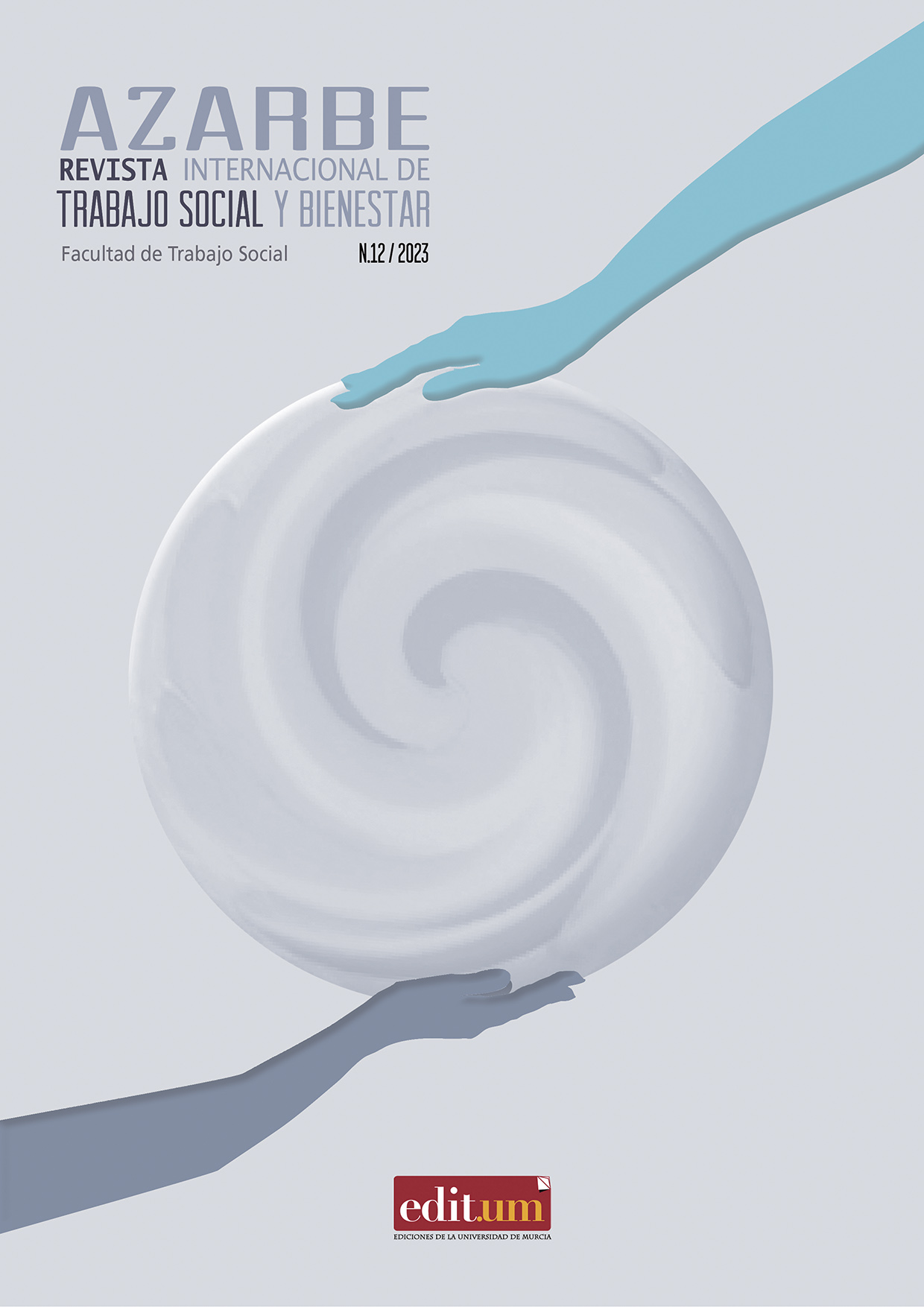Care processes and impact of COVID-19 on female caregivers.
Case study in the province of Alicante
Abstract
This article is to present the analysis of the narratives of women who care for family members diagnosed with psychological suffering, about the long-term care processes in the different stages of the life cycle and especially in the pandemic context. The research is situated within the framework of the phenomenological paradigm, using the case study as a method and the semi-structured open biographical interview as a technique for collecting information, whose narrative-episodic element has allowed us to get closer to the experiential world of the
interviewees, from of a narrative-generating question that served to stimulate the story, focusing on their life experiences in relation to the support, attention and care provided throughout their life. An interview structure subdivided into three blocks was developed, where the narrative questions gave us different reactions from the female caregivers and the balance questions turned the interviewees into experts and theorists of themselves. The entire process was submitted to the review of the research
ethics committee of the University of Alicante. The results obtained show that women caregivers of people in situations of special difficulty throughout life identify the meaning of the term care with “being concerned about the other, being attentive and living the life of the other.” This care becomes support when, throughout the different stages they are living, they try to ensure that their son and daughter, brothers and sisters, or family members
can “take care of themselves” and try to support them to achieve a routine that will help them. make more autonomous. It is a self-taught work that begins with the attention that the women interviewed dedicate to their loved ones. The article provides new information about the confinement and pandemic stage from the narratives
of female caregivers in relation to not identifying that stage as the greatest stressor that has marked their lives.
Downloads
-
Abstract461
-
pdf (Español (España))279
References
Amezquita, F.C., Moreno, A.K. (2019). Percepción de carga del cuidado en cuidadores informales de personas con enfermedad mental en Bogotá | Perception of the burden of care in informal caregivers of persons with mental illness in Bogotá. Revista Española De Discapacidad, 7(2), 55-77. http://dx.doi.org/10.5569/2340-5104
Bettio, F., Plantenga, J. (2004). Comparing Care Regimes in Europe. Feminist Economics, 10(1): 85-113. https://doi.org/10.1080/1354570042000198245
Bettio, F., Sinomazzi, A., Villa, P. (2006). Change in Care Regimes and Female Migration: The Care Drain in the Mediterranean. Journal of European Social Policy, 16(3): 271-285. http://dx.doi.org/10.1177/0958928706065598
Brugère, F. (2010). L’éthique du «care». Paris: Presses Universitaires de France. https://doi.org/10.3917/puf.hanle.2010.01.0069
Comas- d’Argemir, D., Bofill-Poch, S. (eds) (2022). Cuidar a mayores y dependientes en tiempos de la covid-19. Lo que nos ha enseñado la pandemia. Valencia: Tirant Humanidades. https://doi.org/10.56247/qua.402
Chappell NL., Reid, RC. (2002). Burden and well-being among Caregiving: examining the distinction. Gerontologist. 42. 772-80. https://doi.org/10.1093/geront/42.6.772
Carretero, S., Garcés, J., Ródenas, F. (2006). La sobrecarga de las cuidadoras de personas dependientes, análisis y propuestas de intervención psicosocial. Valencia: Tirant Lo Blanc. http://envejecimiento.csic.es/documentos/documentos/polibienestar-sobrecarga-02.pdf
De la Cuesta -Benjumea, C. (2005). La artesanía del cuidado: cuidar en la casa a un familiar con demencia avanzada. Elsevier. Enfermería Clínica. Vol. 15 Nº 6. https://www.elsevier.es/es-revista-enfermeria-clinica-35-articulo-la-artesania-del-cuidado-cuidar-13082990
Fernández, C.M., Cueto, I., Grande, M.L. (2020). Diferencias de carga en el cuidado asociadas al género. Ene, 14(1), 1416. Epub http://scielo.isciii.es/scielo.php?script=sci_arttext&pid=S1988-348X2020000100006&lng=es&tlng=es.
Gilligan, Carol. (1982). En una voz diferente: teoría psicológica y desarrollo de la mujer. Cambridge, MA: Prensa de la Universidad de Harvard.
González-Rodríguez, R., Pastor-Seller, E. (2019). Realidades de emergencia social en personas en situación de dependencia: indicadores y respuestas por parte del sistema de Servicios Sociales en España. En E. Pastor Seller, y L. Cano Soriano (Eds.), Respuestas del Trabajo Social ante situaciones de emergencias sociales y problemáticas sociales complejas de México y España (pp. 223-240). Dykinson.
Martínez Buján, R. (2010). La reorganización de los cuidados familiares en un contexto de migración internacional. Cuadernos de Relaciones Laborales ISSN: 1131-8635 Vol. 29, Núm. 1 (2011) 93-123.
Martínez Buján, R. (2022). Transición: la articulación de programas comunitarios en el sistema público de bienestar tras la Covid-19. Revista Documentación Social, Nº 10.
Minguela-Recover, M.A.,Camacho-Ballesta, J. A. (2015). Cuidados mixtos y cuidados informales a los mayores dependientes, ¿son complementarios o sustitutivos?: una visión comparada entre los países del sur de Europa. Zerbitzuan: Gizarte zerbitzuetarako aldizkaria. Revista de servicios sociales, 58, 15-25. http://dx.doi.org/10.5569/1134-7147.58.02
Molinier, P. (2013). Le travail du care. Paris: La Dispute. http://dx.doi.org/10.4000/nrt.1195
Lyon, D., Gluksmann, M. (2008). Comparative Configurations of Care Work across Europe. Sociology, 42(1). 101-18. http://dx.doi.org/10.1177/0038038507084827
Tronto, J. (1993). Moral Boundaries: A Political Argument for an Ethic of Care. New York: Routledge. https://doi.org/10.1177/000169939503800414
Tronto, J. (2005). Care as the work of citizens: A modest proposal. En Friendman (Ed.), Women and citizenship (p. 130-145). New York: Oxford University Press. https://doi.org/10.1093/0195175344.003.0008
Riemann, G. (1987). Das Fremdwerden der eigenen Biographie: narrative interviews mit psychiatrischen Patienten. München: Fink. https://nbn-resolving.org/urn:nbn:de:0168-ssoar-10330
Riobóo-Lois, B., Pastor-Seller, E. (2023). Procesos de valoración de las situaciones de dependencia en España: el rol del Trabajo Social. Revista Prisma Social, (41), 253–277. https://revistaprismasocial.es/article/view/5023
Rodríguez, P., Vila, A., Ramos-Feijóo, C. (2022) La atención integral y centrada en la persona. Fundamentos y Aplicaciones en el Modelo de Apoyo y Cuidados. Madrid: Tecnos.
Schütze, F. (1983). Biographieforschung und narratives Interview. In: neue praxis, 13. Jg., H. 3, S. 283–293. https://nbn-resolving.org/urn:nbn:de:0168-ssoar-53147
Copyright (c) 2023 AZARBE, International Journal of Social Work and Welfare

This work is licensed under a Creative Commons Attribution-NonCommercial-NoDerivatives 4.0 International License.
Las obras que se publican en esta revista están sujetas a los siguientes términos:
1. El Servicio de Publicaciones de la Universidad de Murcia (la editorial) conserva los derechos patrimoniales (copyright) de las obras publicadas, y favorece y permite la reutilización de las mismas bajo la licencia de uso indicada en el punto 2.
2. Las obras se publican en la edición electrónica de la revista bajo una licencia Creative Commons Reconocimiento-NoComercial-SinObraDerivada 3.0 España (texto legal). Se pueden copiar, usar, difundir, transmitir y exponer públicamente, siempre que: i) se cite la autoría y la fuente original de su publicación (revista, editorial y URL de la obra); ii) no se usen para fines comerciales; iii) se mencione la existencia y especificaciones de esta licencia de uso.
3. Condiciones de auto-archivo. Se permite y se anima a los autores a difundir electrónicamente las versiones pre-print (versión antes de ser evaluada) y/o post-print (versión evaluada y aceptada para su publicación) de sus obras antes de su publicación, ya que favorece su circulación y difusión más temprana y con ello un posible aumento en su citación y alcance entre la comunidad académica. Color RoMEO: verde.














